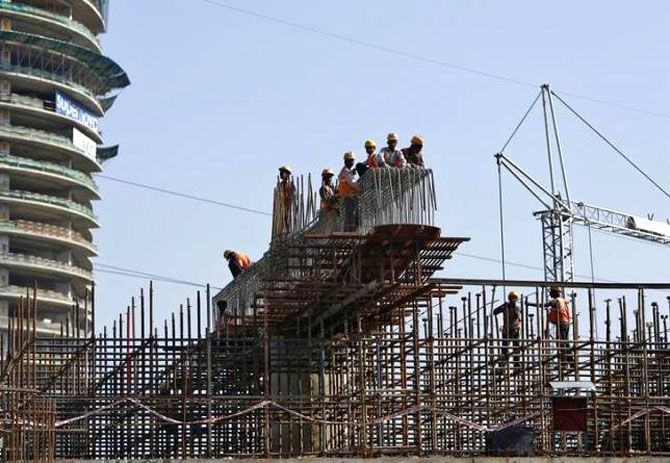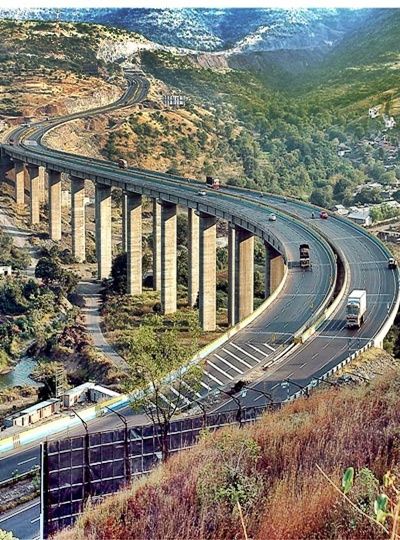'2017-2018 will be one of the best years for the country.'
'The wheel has finally started moving in the right direction. It should pick up momentum in the next 8 to 9 months to have a positive impact on the economy'

Sunil Kanoria, the president of The Associated Chambers of Commerce & Industry of India, tells Shobha Warrier/Rediff.com in in an exclusive interview that the Modi government needs to address a few issues to ensure that India grows at 8% consistently.
Kanoria, bottom, left, the co-founder and vice-chairman, Srei Infrastrcture Finance Ltd, wants the Goods and Sales Tax to be introduced in the pure form and not diluted to give leverage to some states that are into manufacturing.
From the industry's perspective, do you see the Indian economy in a positive note now?
I would say it is getting positive slowly. From 2010 onwards, because of poor administration, the judiciary had to intervene in every aspect like the 2G verdict and the coal scam.
With so many scams getting exposed every day, and the retrospective tax issue, the entire atmosphere was so negative that many international investors lost huge amounts of money.
The five years of policy paralysis, poor governance and wrong activism had a massive impact on India's economy and businesses.
The damage done during the period was so huge that it is taking time to come out of it. Everyone around was frustrated and there were high hopes when this government came to power in 2014.
True, it is taking time for this government to correct all the wrongs, but they are taking the right steps by making some corrections in the regulatory framework and by ushering in transparency in governance.
We are starting to see some changes. For example, in the road sector, projects were stuck, but now they are getting released and work has started once again.
The damage was huge and people were badly bruised in terms of high debt and heavy leverage Industry, thus, needs a large amount of capital to kickstart everything. Capital has started coming in as Prime Minister Narendra Modi has been able to market India very well.
Global investors are looking at India with renewed interest and foreign funds have started flowing. The increase in foreign direct investment during the past 6 to 9 months is impressive.
 How much did the intolerance debate affect business and India's image?
How much did the intolerance debate affect business and India's image?
India is such a tolerant country that we tolerate intolerance. Are we not talking about it? Are there not debates on intolerance in the media and in Parliament?
The intolerance debate has not affected business at all. We may have witnessed a few stray incidents, but that does not give anyone the right to label the country as intolerant.
As a country, we have tolerated everything. Our scriptures teach us tolerance.
I don't think these incidents have affected India's image. India's image is quite positive and strong internationally. Yes, India has its problems and challenges, and India cannot be what China is. It cannot suddenly grow at 10 per cent.
You said India couldn't be China. Is it because we are a democracy?
Yes. We are a strong democracy and the country has its own pulls and pushes. It is not an easy task to govern India. But even if we are able to grow at 8 per cent consistently over a long period of time, it will be very good.
Is 8 per cent consistent growth possible?
I think it is possible.
Which sector must India concentrate on to attain 8 per cent overall growth? Where do you see the growth happening?
The key sector is infrastructure. India's poor infrastructure is the biggest challenge for 'Make in India' to succeed. The rebuilding process will happen through government expenditure as many suffered losses through public-private partnerships.
When you start building infrastructure, it has a multiplier effect. It will have 15 to 20 per cent effect on the economy as you are creating an asset and distributing wealth. It is the core driver and the onus is on the government.
Of course, public-private partnership will also work, but it is the government who has to kick-start the process, and thankfully that has happened.

Nitin Gadkari says the government is building 14 kms of road per day, and by March, they hope to take it up to 30 kms. Are you happy with this?
The road sector alone cannot kick-start the economy. The Railways also is quite proactive and the ground effects will soon be evident. Many other projects are also off the ground in terms of regulatory framework, which is a good sign.
New projects are being awarded now. Most of the contractors do not have capacity because of past problems. But that problem is now being overcome and new sponsors and new contractors are joining the fray.
Though slowly, the wheel has finally started moving in the right direction and it should pick up momentum in the next 8 to 9 months to have a positive impact on the economy.
China is described as the manufacturing capital of the world. Will Modi's 'Make in India' campaign work?
It will take time for the world to accept it. There are plenty of bottlenecks, which need to be corrected -- like the ease in doing business, the tax regime, and, of course, the GST Bill. The GST Bill is particularly critical.
You are saying the GST Bill is critical while some others say GST is not the Nirvana of the Indian economy.
I would say GST is the Brahmastra that is needed for the economy. The Indian tax system has divided India into different states. Doing business between different states in the country is a nightmare.
Comparatively, it is easier to do business in different countries. Engaging in export and import is easier than doing business within the country.
The GST, is thus, the key thread that will link all the states and conducting business will be easier.
It is very important that the GST is introduced in pure form and not diluted to give leverage to some states that are into manufacturing.
There is a proposal to give different rates to the states that manufacture. Such a proposal will kill the bill. It must be reasonable in terms of rates but not a distorted one.
You mean a GST Bill in the right form can transform the Indian economy?
Yes, it can. I feel the country can have at least 1-1 ½ per cent more growth because of this. For 'Make in India' to happen and international investors to come in, such a bill is absolutely essential. For them, the market is the entire country and not different states.
You may have production in one place and consumption in some other place, so it is essential to ensure easy movement of goods across the country.
Are you hopeful of the GST Bill getting passed?
All parliamentarians should understand that for India to grow, the GST is very important. We appeal to all of them to realise this and rise above their political differences and think about the country.
There were talks about the Land Acquisition Bill in the last session of Parliament, but now you don't hear a whisper. Is it not important for economic growth?
According to me, the Land Acquisition Bill should have been looked at in a different manner. As land is a local subject, you should allow state governments to take a decision on this.
If a state does not create a good policy, industries won't go there. Industry will go to a place where the state is interested in development and welcomes businesses.
Let the central government concentrate on infrastructure asset creation. Let them build roads for the benefit of the nation.
The criticism against the Modi government is that it is selling India to the capitalists and multinationals. How do you respond to this?
It is a wrong thing to say. It is also a very old, wrong, thinking. Nobody is selling the country and it is not feasible to sell the country.
You are attracting capital and bringing in resources and not selling or becoming slaves to multinationals.
Unless you bring in enterprise, how do you create jobs?
You must understand good capitalism is beneficial for the development of the poor.
Those who expected Modi to provide jobs are now getting restless...
After the economic tsunami of the past, most of the people were either in the ICU or on ventilator and they were in pain.
When you are in pain, you expect the doctor to give you an injection and hope for an immediate cure. But it doesn't happen that way. If the disease is too advanced, it takes time to cure.
I am sure when this government occupied the hot seat, they didn't know what kind of mess they were going to face. To correct the mess, you have to take the entire system together.
People expected Narendra Modi to clear all the mess at one go. One thing is clear: The actions taken so far and the guidance given by the Modi government is in the right direction in terms of ease of doing business with transparency as the key driver.
What this government is doing today will result in a stronger foundation tomorrow.
Wherever he goes, Modi talks about no corruption in his government. As a business person, from the industry's point of view, has corruption come down and is there more transparency today?
I would say corruption has come down from what it was in the past.
How long do you think it will take India to see some results?
I feel by the second half of 2016, we will start seeing results. 2017-2018 will be one of the best years for the country.










